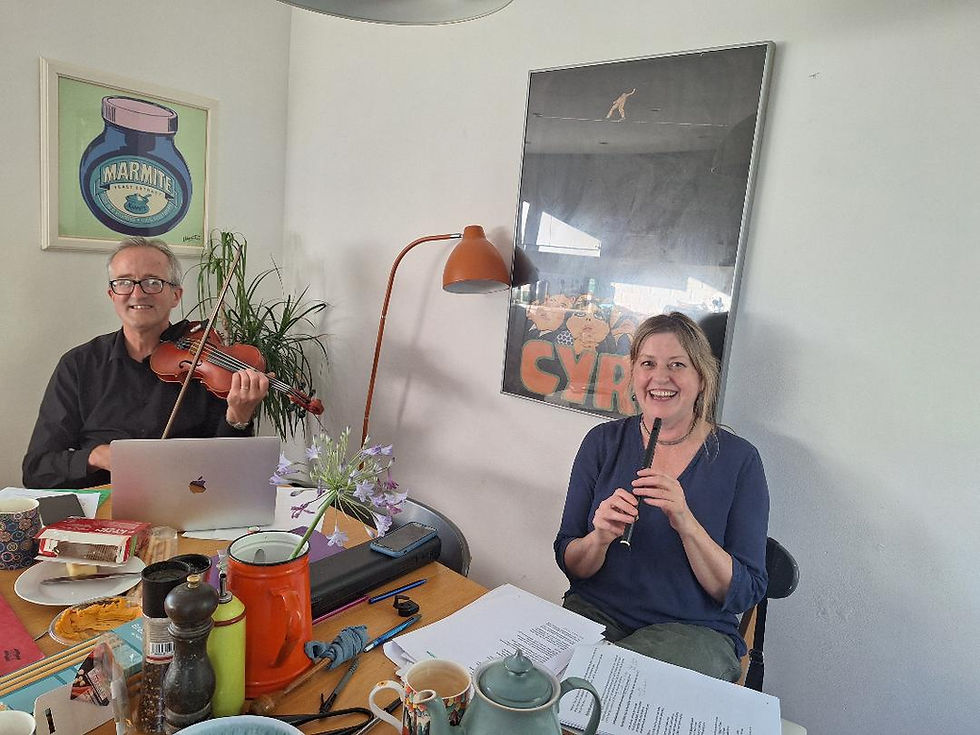Rumpus at Rockley Firs
- Beatrice Parvin

- Jul 22
- 3 min read
Rehearsing my favourite ‘Rockley Firs’ for upcoming performance of folk operetta, 'Captain Swing and the Blacksmith' in Oxford , October 18th.

This jaunty tune rolls along the stave on a springy 6/8. Sung by Frank, he tells the tale of a victorious poacher who recounts his triumph after being acquitted at Salisbury Assizes. On Sunday rehearsal, Em decided to add the whistle. A perfect addition, invoking the playful yet rebellious energy of the song.
Rockley Firs is a tiny Wiltshire village, which was known for its abundant hare population. The poacher boasts of his surprise at initially getting off scot-free as, ‘the moon shone bright, and the stars gave light’, only to be arrested later at the tavern – where presumably he is boasting of his exploits or handing over his ill-gotten gains.
‘A special warrant it was brought in, and taken I was in Cole’s kitchen’. I love the intimacy of the lyrics and the specific naming: What was Cole’s kitchen? Perhaps an ironic moniker for a filthy, rat-ridden lock up in the village. We have ‘Devil’s kitchen’ in Snowdonia, named as such because of its dark, craggy, dangerous form. A few old lock ups remain. On Salisbury Plain, the village of Shrewton boasts a domed brick structure known as the ‘blind house’, due to its lack of light. In Wheatley, Oxfordshire, a small brick pyramid stands on the bridge, a poky cramped space, barely large enough to stand up.
‘Mark Hanks came in before it was light’. Who was Mark Hanks? A man who ran a local lock up, and known by our poacher? Temporary lock ups were often next to a pub and managed by the landlord, a respected member of the community and pre-police force, who took on the role as law enforcer. So, Cole’s kitchen could be an actual basement kitchen with shackles attached to the wall, and Mark Hanks the landlord of a pub, whose name was abbreviated to Cole.
The song gives us an insight to the legal process of the day, and the stages involved after an arrest. Mark Hanks announces at dawn, ‘young man, you must away, to Marlborough gaol this very day’. Things are moving faster than usual, perhaps our anti-hero, full of esprit, assumed his mum might have sweet-talked the landowner. Perhaps, Mark Hanks who knew his entire family, had hopefully convinced the special constable that this was a one-off incident, and spoke of his good character. After all, others had got off before.
The words that remain in a song are there for a reason, and this announcement in reported speech, lands like a rock at his feet. This is where the song turns, and a light-hearted escapade at moonlight is determining his fate. The authorities have decided to make an example of him.
Shackled, he is taken to Marlborough gaol, ‘where locks and bolts like bullets did fly’.
But they weren’t waiting around – someone is wanting to get this poacher convicted quickly as he is ‘off to Salisbury…in irons so strong they bound my hands’, in the next line. But why the court of assizes? Until 1971, these were provincial courts, that dealt with serious offences which were in the scope of ‘capital crimes’ such as rape, fraud, murder, armed robbery, and overseen by visiting high-court judges from London. This is not going well; especially if Rockley Firs dates to the 1790s or early 1800s as the crown was eager to get as many healthy males over to the new colonies of Tasmania [previously Van Diemans Land] and Australia as possible.
Yet, he announces in the penultimate verse, ‘My trial is over, I am got free, I am not transported as you all may see’. Who knows what occurred? A weeping young wife turned the harsh judges heart? A local gentleman came to the rescue? One thing’s for sure, this is definitely something to celebrate. Thus, the exuberance of the song, and the devil-may-care declaration in the last lines, ‘For poaching is the life for me!’ calls ‘for a brandy all in a strong glass’.










Comments